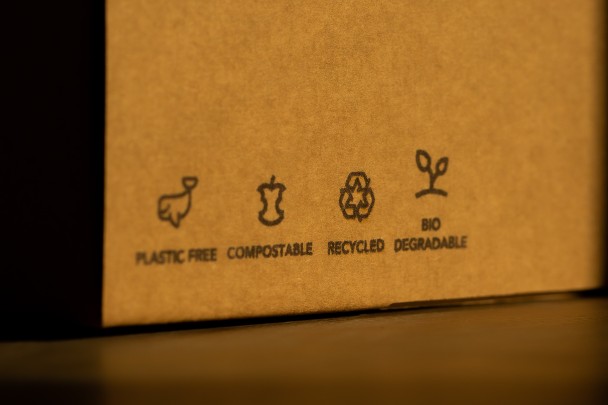November 03, 2022 Industry news
Businesses and authorities around the world are increasingly working together to ensure more sustainable economic, environmental and social measures are adopted and implemented. More and more consumers are also demanding choice based on sustainable product characteristics and provenance.
Against this backdrop, small and medium-size enterprises (SMEs) are in a unique position to drive change. It is estimated that SMEs account for half of all UK business-driven emissions, and almost a third of all current UK greenhouse gas emissions, including those from households, industry and government.
To help our members lay solid foundations for sustainable growth, our latest interactive panel with GTM Global brought together a variety of sustainability experts to share thoughts and guidelines.
In part one of our summary, FuturePlanet’s Carl Pratt and Andrew Taylor from Greentech provide commentary on why committing to achieving net zero will be essential for many businesses.

Carl Pratt
Carl Pratt, founder and creative director of FuturePlanet
FuturePlanet is a community of action. By working with partners such as GS1 UK, we aim to create a more circular, equitable, regenerative and sustainable world.
Our cross-sector, cross-functional community empowers businesses by providing solutions and support on impact challenges and facilitating collaboration to discover opportunities for action.
We help our members map out impact themes from biodiversity and carbon reduction, all the way through to waste and water. Then, through a programme of activities and curated working circles, we connect them with peers who can help them to achieve their goals.
Building a sustainable future
Sustainability is a societal goal that broadly aims for humans to safely coexist with nature. What does that mean for us as business leaders? It means considering business in a deeper context than just making money. It is about embracing the triple bottom line, people, planet and profit.
To do this we need to reimagine all our roles, all our actions and our Key Performance Indicators (KPIs). This is about more than simply being altruistic. We have a target in the UK to hit net zero by 2050.
There are many challenges to overcome if we are to achieve this goal. If we fail, unabated climate change will have dramatic effects on inequality, poverty and economic opportunity. With just seven years to keep climate change below 1.5 degrees, the time to act is now.
We are also starting to see employee’s KPIs drive change. 36 percent of those we surveyed stated that their KPIs directly contribute to sustainability targets. Scaling up climate causes, KPIs, contracts and remuneration and connecting them to climate action is a great way for us to kickstart transformation and engage whole organisations.
The Chancery Lane project is an excellent resource for this. Few businesses have dedicated, in-house sustainability professionals so there is a real need to create support for time pressed non-experts.
There is cause for optimism as circularity and sustainability are now influencing Innovation. One such example of this will be the implementation of deposit return schemes (DRS) which will drive resource efficiency and fundamentally change the way we recycle for the better.
We are seeing an increasing number of businesses changing product designs or dropping entire ranges to reduce environmental impact. There is a noticeable shift from product sales models to product as a service.
This could have immense impact as rather than purely focusing on driving sales, these businesses are actively working to build better relationships with their customers.
Data powers progress
Switching to more sustainable materials and understanding their provenance is a near-term priority for many. This is a huge opportunity and there is a growing demand for clear and reliable data to inform material choices.
Accurate data makes transparency possible so, by tracking, tracing and sharing information on attributes and origins, GS1 standards can help businesses improve in these areas and protect against accusations of “greenwashing”.
Another space that the GS1 standards can support on is certifications. Certifications and the frameworks they provide are driving change, not only for pioneering new brands, but also for much larger established organisations such as Danone and Nestlé.

Threatening lives and livelihoods
While progress is certainly being made, we still need to help leaders make the connection between climate and biodiversity. A recent UN report found that one million animal and plant species are now threatened by extinction, highlighting how our current model of consumption is eroding the very foundations of our economies, threatening livelihoods, food security, health and quality of life worldwide.
These major global challenges are interlocked and we can't focus on just one, we have to look at all different aspects.
Sustainable sourcing
One solution to this is for businesses to adopt sustainable sourcing policies. Many of the organisations we surveyed highlighted this as a priority, suggesting that it's not simply a case of managing costs at all costs. For many, managing their environmental impact is as important as saving money and, by increasing transparency and traceability, GS1 standards can help businesses develop a full picture of their global and local supply chains.
By analysing efficiency and revealing hidden costs, businesses can take the necessary steps to reduce their environmental impact with decisions based on trusted data. If you can't see it, you can't manage or act on it, so ensuring access to presents a real opportunity.

More to be done
The impacts of climate change will be felt the most by those that have the least, often in the poorest countries and communities throughout the world and supply chain.
We need to prioritise a just transition that values people over prices. Our research revealed that most businesses are not measuring scope three emissions. This is alarming as methane, which is still overlooked by many, has more than eighty times the warming power of carbon dioxide.
Working together to understand the true impact of supply chains is one of the areas where we can make the quickest wins

Andy Taylor
Andy Taylor, commercial director of Greentech
Net zero market drivers are rapidly gaining prominence. Accelerating to net zero is now a business-critical issue that every company should explore and embrace.
I have spent 25 years working with corporates on large-scale transactions. One of the main things this has taught me is that many companies face inertia and obstacles when it comes to implementing meaningful change. So, in the last four years I have pivoted my career to join Greentech as one of its founding partners
We invest in and mentor market ready net zero technologies, helping the businesses behind them scale internationally and enter large corporate markets. The focus of our portfolio is on decarbonizing buildings and we're now bringing funded net zero solutions to buildings across the UK.
We are working to support the decarbonizing of transport fleets and have a heavy focus on the circular economy.
We're all about global thought leadership and demonstrating examples of delivered innovation. To support this, we have founded a new insights and education app called the CNZ Eco-forum which provides daily, on-demand micro content on what global net zero looks and the actions required to deliver it. Users can emulate, support, and nurture their company in doing the same by becoming net zero ambassadors.
A mega trend
Net zero is a mega trend with major risks but also opportunities. There's a massive climate storm coming at companies that is largely driven by consumer demand.
We've released surveys on our app that show 73 percent of Gen Z and millennial Americans are expressing a direct preference to only buy from net zero companies and will even boycott those that are not.

These consumer trends are present throughout Europe with 50 cent of British people feeling guilt when they buy products that are not net zero.
Companies now have to embrace a whole new paradigm in terms of customer appeal base, and this goes to the heart of their brand proposition.
Patagonia are a prime example. By becoming a not-for-profit organisation and directing their profits to environmental causes, they've transcended the outdoor apparel market using net zero as a fundamental brand enhancement.
Tempting talent
Another major pressure point that is currently impacting companies is recruiting and retaining staff. A lot of the Gen Z cohort coming out of universities only want to be working for companies with a mission, values and purpose.
For example, some of the top young lawyers are refusing to work with the top firms if they have a fossil fuel and mining legacy client base. Some senior executives in large organisations like Shell and BP are resigning because they no longer feel comfortable working for such companies.
Attracting investors
The increasing focus on net zero is also impacting investment. A lot of listed companies are now experiencing significant issues with their investor base, some of whom are threatening to withdraw support if they don’t commit to achieving net zero. Many companies trying to raise capital must now demonstrate robust net zero credentials.
There is also access to green bonds, a type of fixed-income instrument that is specifically earmarked to raise money for climate and environmental projects, and companies can lower the cost of debt if they willing to embrace a strong environmental, social, and governance (ESG) proposition.

Future-proofing
Consumer demand, staff expectations and legislative pressures will continue to grow so companies that fail to adapt and prepare for the future will be putting themselves at risk.
Embracing net zero can act as a real brand enhancement that will appeal to customers, new talent and investors alike while preventing adverse public scrutiny. We highly recommend that SMEs start to look very closely at their net zero credentials as this can have a make a huge difference to your future success.
If you want to mitigate carbon and waste, the best starting point is to measure what you currently have. Partnering with leading companies such as Planetly and Compare Your Footprint can help both large and small companies measure emissions and there are a wide range of global consultancies who can audit businesses to assess their progress and develop a clear path for the future.



